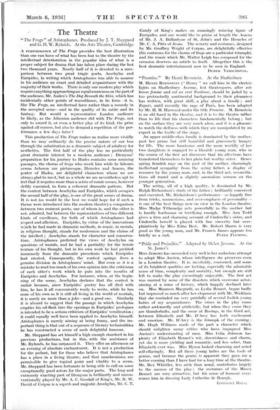The Theatre
"The Frogs" of-Aristophanes. Produced by J. T. Sheppard and G. H. W. Rylands. At the Arts Theatre, Cambridge A PERFORMANCE of The Frogs provides the best illustration than one can have of what has been lost to the theatre by the intellectual deterioration in the popular idea of what is a proper subject for drama that has taken place during the last two thousand years. Nearly half of it is devoted to a com- parison between two great tragic poets, Aeschylus and Euripides, in writing which Aristophanes was able to assume in his audience an exact and detailed acquaintance with the majority atheit. -Wotks. There is only one modern play which requires anything approaching an equal awareness on the Part of the audience-, Mr. Auden's The Dog Beneath the Skin, which has incidentally other points of resemblance, in its form—it is, like The Frogs, an intellectual farce rather than a comedy in the-accepted sense—and in the quality of its satire and its fantasy. But would a representative London audience be likely, as the Athenian audience did with The Frogs, not only to award it, or even a better play of its kind, the prize against all corners, but also to demand a repetition of the per- formance a few days later ?
This production of The Frogs makes us realise more vividly than we may' ordinarily do the precise nature of our loss through the substitution as a dramatic subject of adultery for aesthetics. The first half of the play has no particularly great dramatic interest to a modern audience; Dionysus' preparation for his journey to Hades contains some amusing passages, the chorus of frogs who mock him while he labours across Acheron are picturesque, Heracles and Aeacus, the porter of Hades, are delightful characters whom we are always glad to meet, but as a whole we are nevertheless apt to feel that it requires more than a series of comic scenes, however deftly executed, to form a coherent dramatic pattern. But the contest between Aeschylus and Euripides, which occupies the second half of the play, is one of the great scenes of drama. It is not (as 'would be the best we could hope for if such a theme were introduced into the modern theatre) a comparison between two eminent poets, one of whom is, and the other is not, admired, but between the representatives of two different -kinds of excellence, for both of which Aristophanes had respect and affection. Euripides, by virtue of the innovations which he had made in dramatic methods, in music, in morals, in religious thought, stands for modernism and the claims of the intellect ; Aeschylus stands for character and conserva- tism. Aristophanes preferred the views of Aeschylus on questions of morals, and he had a partiality for the heroic texture of his thought, but in his own work he had profited immensely from the dramatic precedents which Euripides had created. Consequently, the contest springs from a genuine division in Aristophanes' mind. But even so it is a mistake to read too much of his own opinion into the criticisms of each other's work which he puts into the mouths of Euripides and Aeschylus. For instance, when, at the begin- ning of the scene, Aeschylus declares that the contest is unfair because, since Euripides' poetry has all died with him, he has it all conveniently ready to recite, while he has none of his own as it is still all living in the world of mortals, it is surely no more than a joke—and a good one. Similarly it is absurd to suggest that the passage in which Aeschylus empties his oil-flask into the openings in Euripides' prologues is intended to he a serious criticism of Euripides' versification ; A could equally well have been applied to Aeschylus himself. Aristophanes is merely aiming at being funny, and the im- portant thing is that out of a sequence of literary technicalities he has constructed a scene of such delightful humour.
Mr. Sheppard has set himself a high enough standard in his previous productions, but in this, with the assistance of Mr. Rylands, he has surpassed it. They offer an afternoon or an evening of absolute enchantment. It is not a production for the pedant, but for those who believe that Aristophanes has a place in a living theatre, and that anachronisms are permissible to give topical point and vitality to a scene. Mr. Sheppard has been fortunate in being able to call on some exceptionally good actors for the major parts. The long and extremely exacting part of Dionysus is brilliantly and uncon- ventionally played by. Mr. A. C. Goodall of King's, Mr. R. W. David of Corpus is a superb and majestic Aeschylus, Mr. C. T. Gandy of . King's snakes - an amusingly mincing figure of Euripides, and one would like to praise at length the Aeaeus • of Mr. J. A. Ballantvne of St. John's and the Ileraeles of Mr. C. A. Pitts of Jesus. The scenery and costumes, designed by Mr. Geoffrey Wright of Corpus, are delightfully effective (his costumes for the chorus of frogs are a particular triumph), and the music which Mr. Walter Leigh has composed for the occasion deserves an article to itself. Altogether this is the best dramatic entertainment now to be seen in England.
DEREK VERSCIIOYLE,
















































 Previous page
Previous page